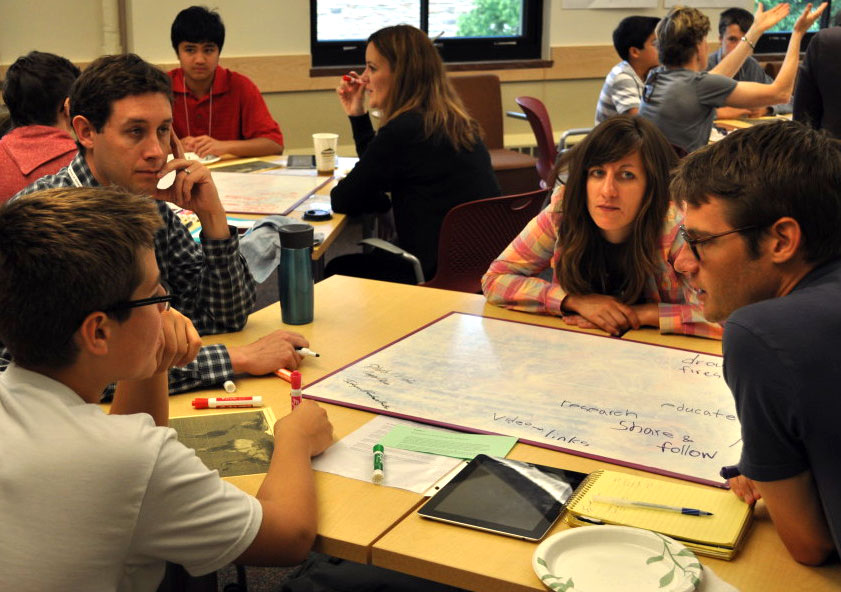Uses: Playlists for Tools
Here are STEM Teaching Tool Playlists! Our STEM Teaching Tools can be used for a range of purposes. The following are some specific uses that have been developed. You can think of them as 'playlists' of STEM Teaching Tools to orient yourself or different audiences to a particular topic in STEM education. We will keep adding more over time.
Suggested STEM Teaching Tool Uses, or Playlists:
- Introducing the NGSS / NRC Framework Vision to Teachers (50-70 min session)
- Introducing the NGSS / NRC Framework Vision to School Principals (30-45 min session)
- Engaging Teachers with Equity in Science Education (50 min)
- Incorporating Scientific Argumentation into Your Classroom (105 min)

Introducing the NGSS / NRC Framework Vision to Teachers (50-70 min session)
APPROACH: Ask teachers gathered in small groups to read the following tools—preferably as printed PDFs or online. Discuss the Reflection Questions for each (listed in a separate pull-out box on each tool), in the following sequence. This can lead into a discussion of how these teachers can plan to implement the NGSS / Framework vision in their classrooms.
- Next Generation Science Standards: What's different, and do they matter? (10 min)
- Overview: How can we promote equity in science education? (10 min)
- Why focus on science and engineering practices--and not "inquiry?" Why is "the scientific method" mistaken? (10 min)
- Practices should not stand alone: How to sequence practices in a cascade to support student investigations (10 min)
- How Can I Get My Students to Learn Science by Productively Talking with Each Other? (10 min)
- Optional: Why should students investigate contemporary science topics—and not just "settled" science? (10 min)
- Optional: Are there multiple instructional models that fit with the science and engineering practices in NGSS? (Short answer: Yes.) (10 min)
- Leave them with the following resources for further inquiry and sharing with their network and peers:
- Next Generation Science Standards (NGSS) website: the main site for NGSS; be sure to highlight the NGSS Appendices
- NRC Framework for K-12 Science Education: the consensus vision that guided the development of the NGSS; everyone should read the Framework to understand the goals of the NGSS
- STEM Teaching Tools: our professional resources for supporting implementation of NGSS; encourage them to browse the collection of tools available
- NSTA NGSS Portal: a collection of resources for science teachers on implementing NGSS

Introducing the NGSS / NRC Framework Vision to School Principals (30-45 min session)
APPROACH: Ask principals gathered in small groups to read the following tools—preferably as printed PDFs or online. Ask them to discuss the Reflection Questions for each (listed in a separate pull-out box on each tool), in the following sequence. This can lead to a larger discussion of how to support and plan for implementation of the NGSS / Framework vision within their buildings.
- Next Generation Science Standards: What's different, and do they matter? (10 min)
- Overview: How can we promote equity in science education? (10 min)
- What school building administrators should know about the new vision for K-12 science education (10 min)
- How to define meaningful daily learning objectives for science investigations (10 min)
- Optional (if time allows): Research Brief: Supporting teacher professional communities to implement school-wide initiatives (15 min)
- Leave them with the following resources for further inquiry and sharing with their faculty:
- Next Generation Science Standards (NGSS) web site: the main site for NGSS; be sure to highlight the NGSS Appendices
- NRC Framework for K-12 Science Education: the consensus vision that guided the development of the NGSS; everyone should read the Framework to understand the goals of NGSS
- STEM Teaching Tools: our professional resources for supporting implementation of NGSS; encourage them to browse the collection of tools available
- NSTA NGSS Portal: a collection of resources for science teachers on implementing the NGSS

Engaging Teachers with Equity in Science Education (50 min)
APPROACH: It can be difficult to engage in concrete discussions of educational equity. The following approach has worked to get teachers to quickly engage in such discussions. This approach asks small groups to choose one of two briefs to sink into, and has been particularly productive in getting people to think about specific details of equity and social justice in science education. Download and use these slides to engage teachers with the following STEM Teaching Tools in small groups. (Before engaging with these resources, it is expected that teachers are generally oriented to the NGSS / NRC Framework Vision.)
As part of the slide sequence, ask small groups to choose one of the following two tools to read and discuss:
- Engaging English Learners in the Science and Engineering Practices
- Implementing Meaningful STEM Education with Indigenous Students & Families
Regroup and debrief as a whole group, asking small groups to share out salient ideas and pressing questions. Then, ask groups to read and discuss both of the following (as prompted by the slides).
- Overview: How can we promote equity in science education?
- How to launch STEM investigations that build on student and community interests and expertise
Close with a full-group discussion on ideas and next steps from this session.

Incorporating Scientific Argumentation into Your Classroom (105 min)
APPROACH: The practice of argumentation—that is, developing, exploring, analyzing, and refining lines of reasoning and explanation in evidence-based ways—is essential to the work of scientists and to scientific thinking and learning. The complex practice of argumentation helps people articulate their individual reasoning, explore the ideas and perspectives of others, and refine a shared understanding of scientific ideas. It also help students learn how the enterprise of science fundamentally operates through social processes of critique, analysis, and collaboration. Being able to engage in argumentation is a fundamental form of scientific literacy promoted through the new vision. Engaging in argumentation also helps highlight to students that science and engineering are evolving bodies of knowledge based on the assessment of evidence or the iteration of designs—rather than a fixed set of facts to be memorized.
And yet, the practice of argumentation has tended to be underemphasized in the context of science education. In response, A Framework for K-12 Science Education and the resulting Next Generation Science Standards list "Engaging in Argument from Evidence" as one of the eight science and engineering practices that all students should consistently engage in.
This short course is designed to help educators think about how the practice of argumentation relates to the practice of explanation, research- and practice-based strategies that can foster rich forms of student argumentation, and how argumentation opportunities can be implemented in more equitable ways.
ACTIVITIES:
- Watch this video overview of the argumentation practice (from The Argumentation Toolkit project) (5 min)
- Read pg. 71-73 of the NRC Framework for K-12 Science Education, which contains a description of the practice of argumentation, goals for students by grade 12, and a vision for students' progression toward these goals. Where in this progression are your students at the beginning of the school year? At the end? Right now? (10 min)
- Read the basic distinction between argumentation in science and engineering on pg. 52 of the Framework. Are you offering students opportunities to learn through engineering? If so, where do they—or how might they—participate in engineering argumentation? (5 min)
- Is it important to distinguish between the explanation and argumentation practices in the classroom?
Some curricula and instruction do not differentiate between the Framework / NGSS practices of "constructing explanations" and "argument from evidence." Should you? Read this tool and think / discuss. (15 min) - Read this summary of a research synthesis by Eve Manz called "Situating argumentation in student science activity." Reflect on your practice in terms of: (a) focusing argumentation on real scientific questions, and (b) designing for uncertainty in what is understood so that students come to see the need for argumentation. (15 min)
- How can formative assessment support culturally responsive argumentation in a classroom community?
How can students incorporate their personal and cultural knowledge into their practice of argumentation? How can this teaching approach promote equity? Read this tool and think / discuss. (15 min) - Beyond the Written C-E-R: Supporting Classroom Argumentative Talk about Investigations
This tool describes how you can coordinate claims, evidence, and reasoning (C-E-R) in argumentation, and offers strategies to move beyond that model so students understand the nuances and variety of types of argumentation. Read this tool for suggested argumentation structures and consider how you can incorporate them into your teaching. (15 min) - Explore the Different Elements of Argumentation (from The Argumentation Toolkit project) to learn about the role of: (1) evidence, (2) reasoning, (3) student interaction, (4) and competing claims. Watch the first video under each section. (25 min)
- Talk Activities that can Scaffold Argumentation
This tool features a flowchart of purpose-driven talk activities—many of which can support the practice of scientific argumentation in the classroom. Argumentation relates deeply to the purposes of three major branches: (1) critiquing other student's ideas, (2) getting students to revise their thinking, and (3) reaching a consensus understanding. Explore the flowchart and talk activities and evaluate where any would fit well into your classroom. (10 min) - Extension: Read this NSTA article on the Explanation and Argumentation Practices which includes classroom examples (30 min)
- Extension: Read this research chapter summarizing design principles for engaging students in scientific argumentation and collaborative debate (1 hour)
